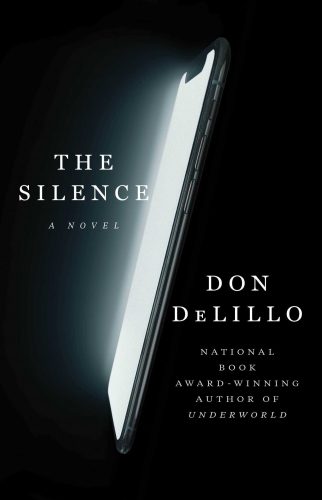Book Review: “The Silence” — Brusque Prophecy
By Drew Hart
Many Don DeLillo fans will overlook this novella’s somewhat stilted dialogue and perfunctory erotic scenes for the sake of another taste of his dark and knowing world.
The Silence by Don DeLillo. Scribner, 120 pp., $22.
Buy at Bookshop

Already, much has been made of The Silence, the most recent entry in Don DeLillo’s striking and acclaimed career. Although a noticeably short venture, the book has generated considerable media attention. This is because some think The Silence, a novella-length tale about the world going dark, anticipated what happened in the wake of COVID-19. DeLillo did in fact begin writing it before the pandemic hit; what’s more, it’s not the first time he has seemed to be prophetic about modern life. Look to his previous, more substantive outings: The Names, with its focus on terrorism, or the piece de resistance, Underworld, with its truly global scale. But there’s just one thing: while the lights do go out in this work, not a great deal is to be made of it.
This could be said to relegate The Silence to the status of other short, fragment-like pieces from the last 20 years. As with The Body Artist and Point Omega, here we are mulling a situation over briefly, and pretty much leaving it at that. After the powerful work we (hopefully) have read from the author, this may leave us with a sentiment along the lines of “that’s it?”
Here is what we get: Jim, an insurance claims adjuster, and Tessa, his Caribbean poetess wife, are flying from Paris to New York, bound for a Super Bowl party at their friends’ apartment. And straightaway, your familiar DeLillo darkness falls, as the plane’s wing catches fire and turbulence knocks Jim in the head. The flight limps into JFK; he is bleeding; they are taken to an emergency room, where his wounds are attended to. (It can’t be too bad! He and Tessa manage to slip into a bathroom for a quickie while waiting?)
The big game has already been underway when the travelers land — “Super Bowl Fifty-Six. Our National Death Wish,” as it is named here — at the hosts Max and Diane’s apartment. The guests are watching, but suddenly the screen goes blank. Their phone and internet also are down. Neighbors in their Manhattan building, whom they’ve never spoken to before (gotta love New York!), theorize that the outages are not due to Chinese meddling, but just a system failure? Waiting for the football game to reappear, tipsy Max begins playing the role of imaginary commentator, entertainingly — it is somewhat in this spirit that the story proceeds. On hand is a young physics teacher, Martin, a former student of Diane’s, who quotes from Einstein repeatedly. (The book is prefaced with an Einstein quote that while it’s unclear what weapons will be used in World War III, “World War IV will be fought with sticks and stones.”)
And thus the stage is set for, well, exactly what? What follows, in the second part of the narrative, after Jim and Tessa join the blank, screen-free gathering — seems to come off like an act in some sort of play. Our characters take turns delivering soliloquy-like speeches, each holding forth about the nature of the here and now. These are entirely philosophical speculations, laced with DeLillo’s familiar dissonance and uneasiness. Dutifully mentioning different technological developments — bitcoins, drones, microplastics, etc.; and dangers — “germs, genes, spores, powders” — each soliloquist has a chance to reflect on the moment at hand. Possibly their speech-like addresses smack of self-deprecation, and echo more hollowly, because of the silence; the repeated takeaways suggest how insignificant these people are. Yet life goes on… Eventually Max goes down to observe the chaotic streets outside the apartment building — the outages have brought initial panic, but later, stillness. Meanwhile, there’s another mechanical sex encounter upstairs between Diane and Martin.
So there you have it — your “that’s it.” You aren’t going to find out what happened later. Now it’s up to the individual reader to decide whether the relatively small nature of The Silence is worth the (tiny) effort. Perhaps it “depends what you like”: many DeLillo fans will overlook the somewhat stilted dialogue, the perfunctory erotic scenes, in favor of another taste of his dark and knowing world. Your faithful correspondent would argue that any day graced by a new offering from the writer is a better day than many, even if accusations of “phoning it in” could possibly be leveled here. One thing I would love to know about him is personal: although his cosmology is modern, almost sinister in being so, nowadays he chooses to live in the very coddled patrician New York suburb I was raised in (and fled!). Get back to me if you figure that out. And sure, in the meantime, pick up the book.
Drew Hart is from Santa Barbara, California
